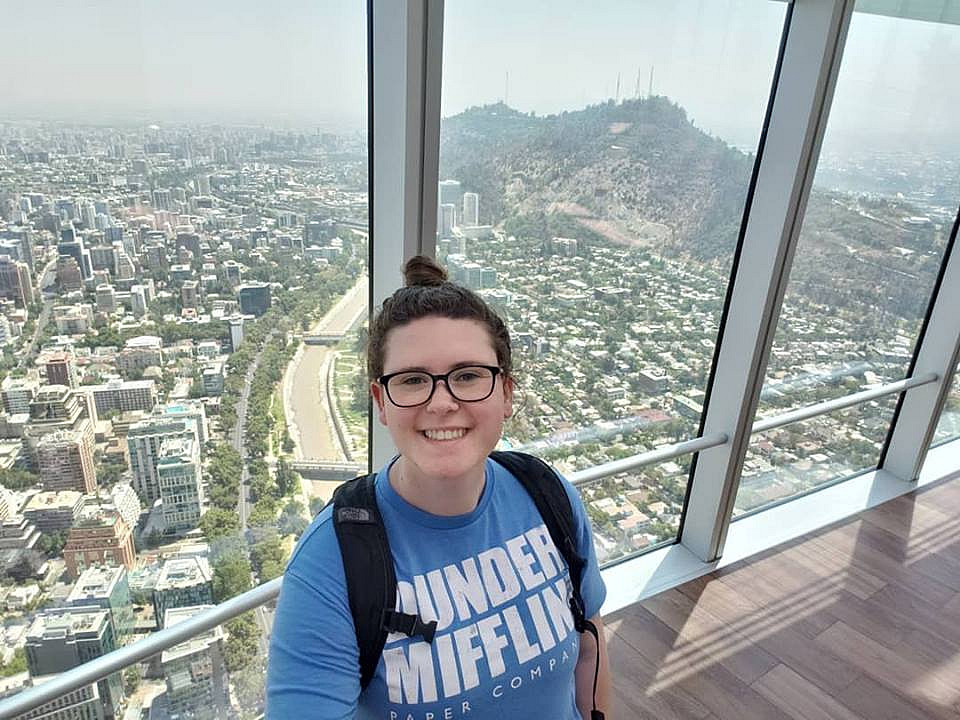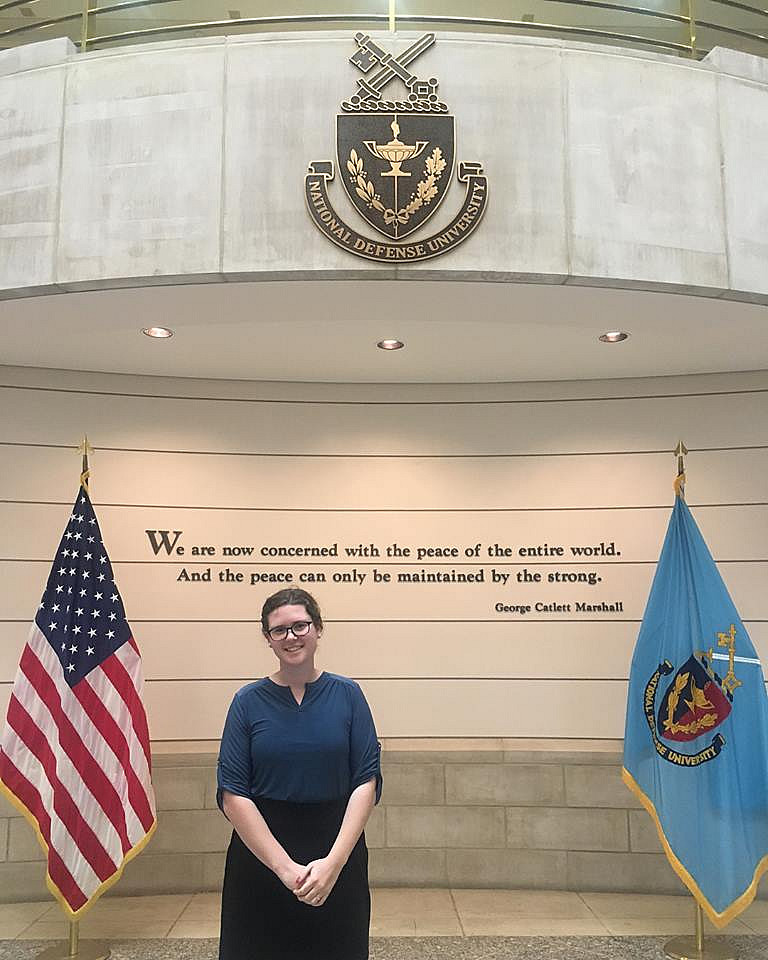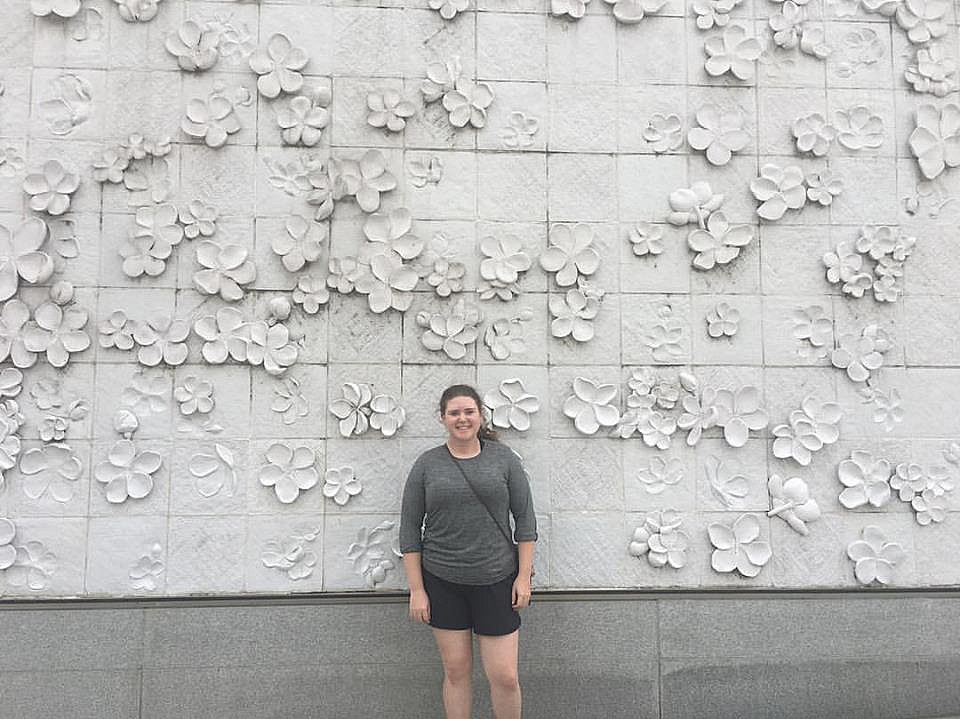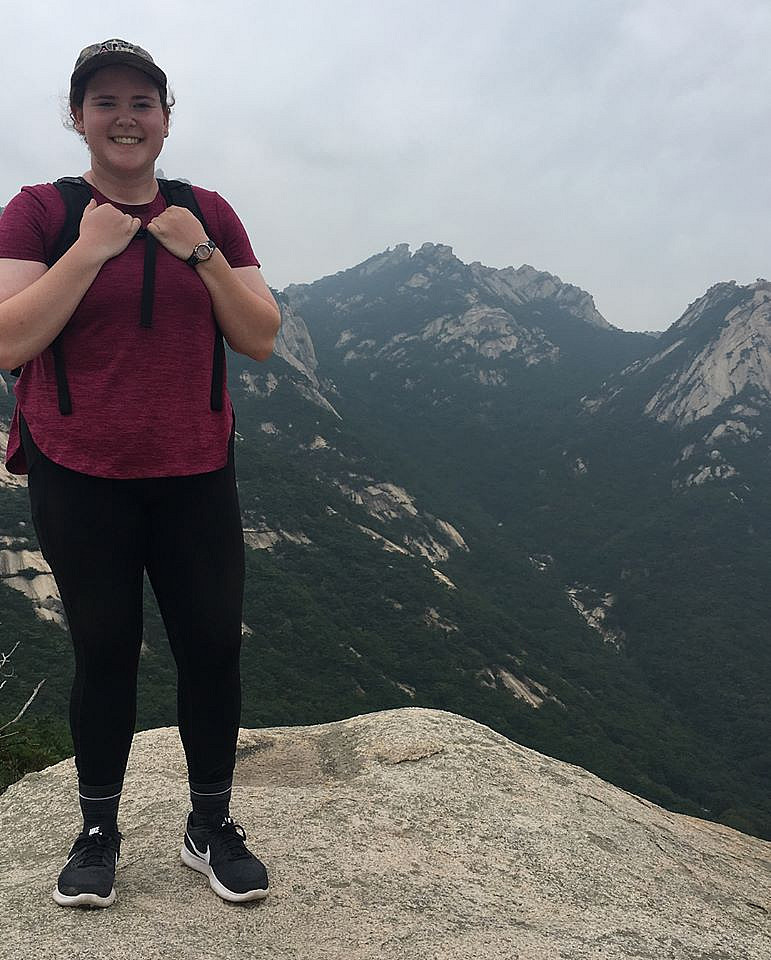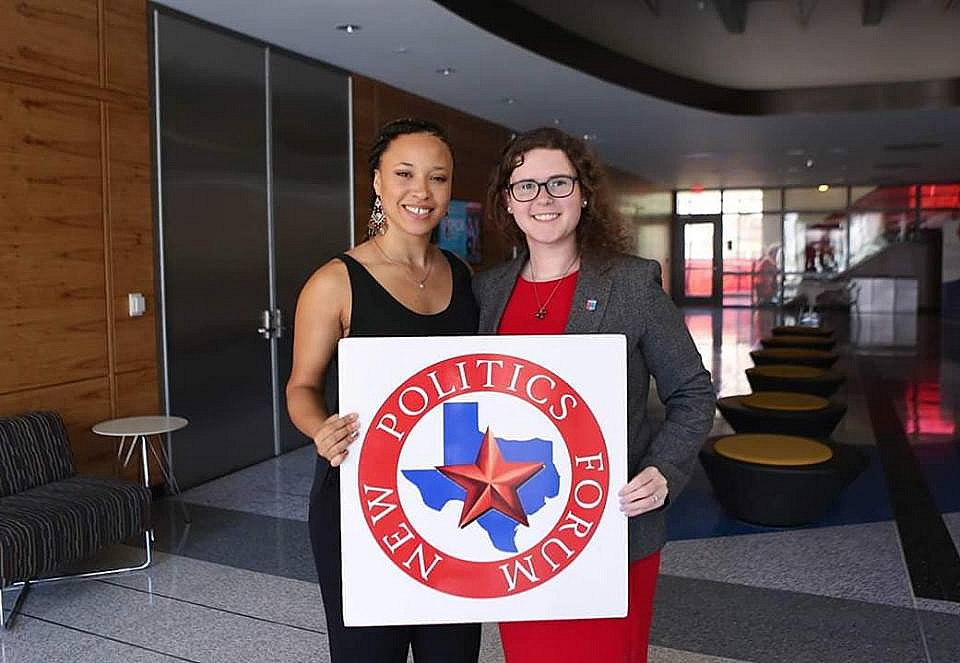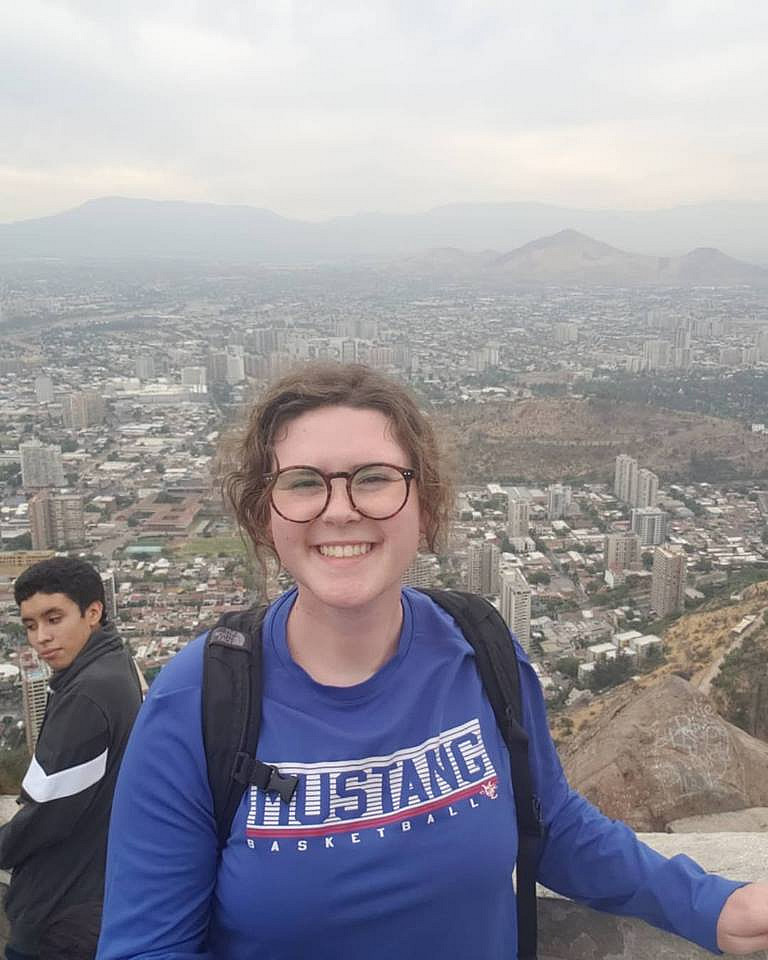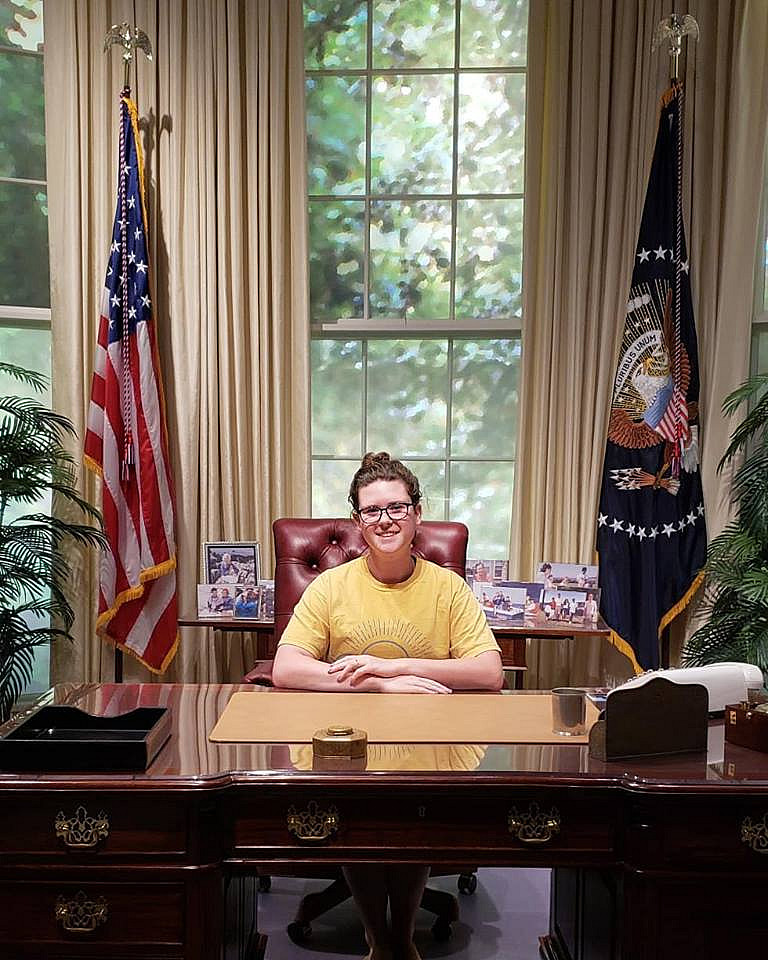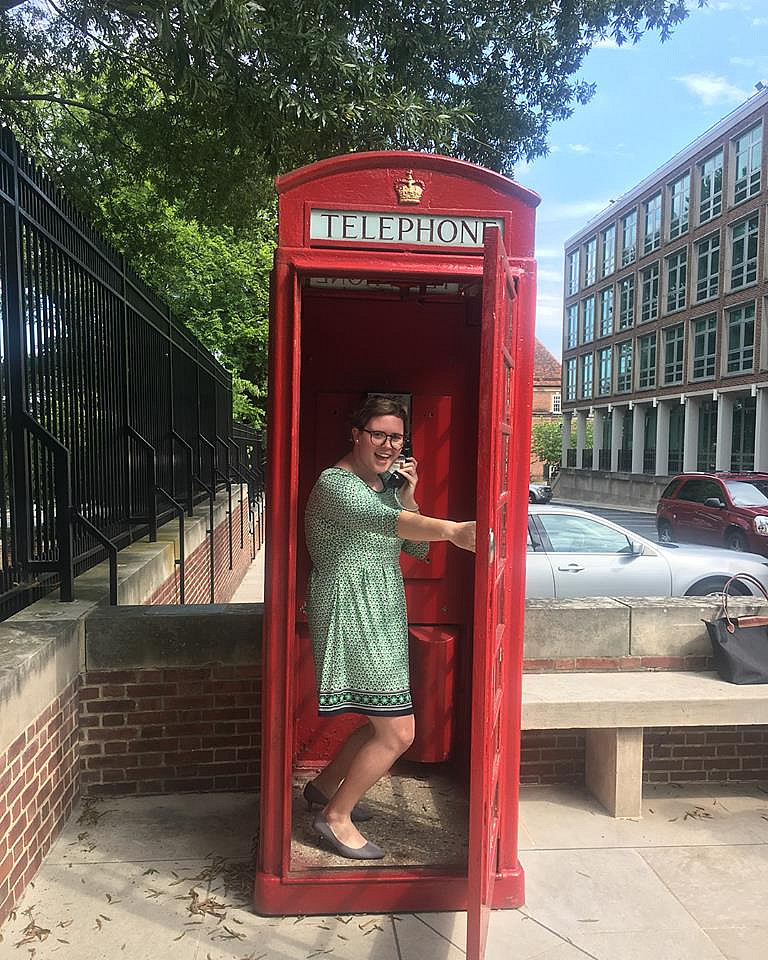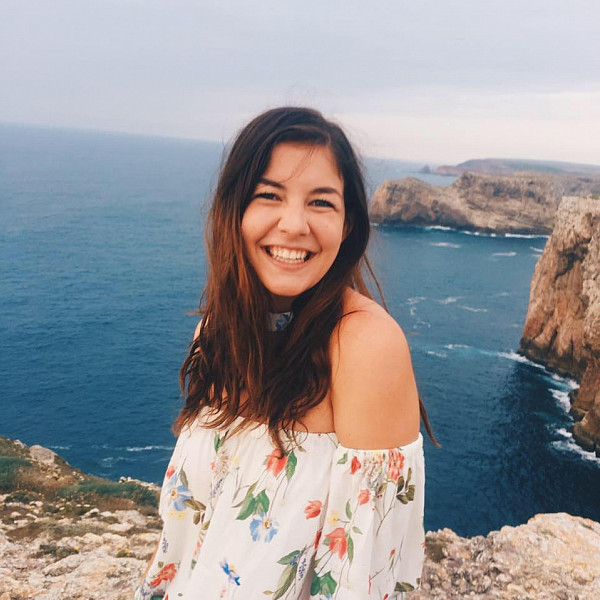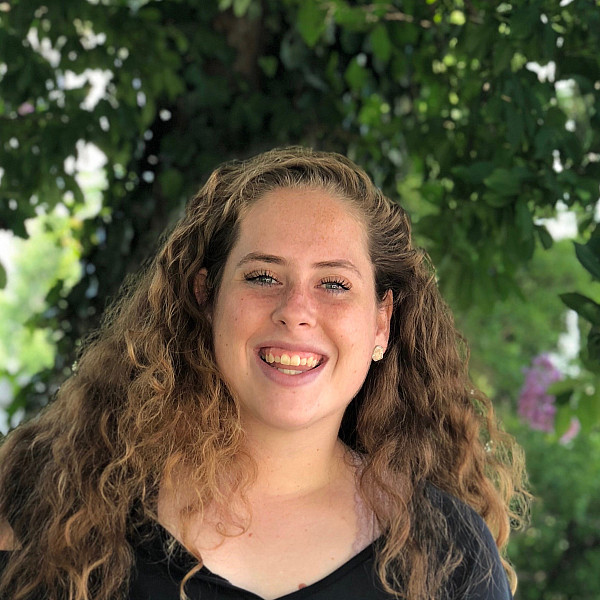News
A Transformative Undergraduate Experience
July 16, 2019
July 16, 2019
At this year’s Research and Creative Works Symposium back in April, Danyale Kellogg ’19 exhibited professionalism and poise—but also a sense of humor. During a presentation with Camille Martin ’19 and Laura Rativa ’20 on Southwestern University’s Project for Free Speech and Civil Discourse, Kellogg joked about how when she had helped organize a series of Table Talks for her fellow undergraduates to discuss political topics, she was excited to propose tax reform as one of the subjects for conversation, but no one else did, and she didn’t understand why. Her remark drew laughs from the audience.
If you get the chance to talk with Kellogg, you might notice that she occasionally will say things like, “None of my stuff makes sense” or “I’m a mess!” But that endearing sense of self-deprecation belies her tremendous achievements and her unquenchable can-do approach to personal, professional, or academic challenges. A history major and German and international studies double minor who has completed numerous internships, studied abroad twice, and learned multiple languages during her four years at Southwestern, Kellogg is a wonderfully accomplished student who is nevertheless approachable and gifted with a quick wit.
“My time at Southwestern has been the adventure of a lifetime.”
“My time at Southwestern has been the adventure of a lifetime,” she has written. But what some might not know is that that adventure almost never came to be.
A first-generation college student
“When I came to this school, I wasn’t even really sure that college was for me,” Kellogg, whose parents didn’t attend college, recalls. But growing up in the Permian Basin, she had just wanted to escape from the small-town life of Midland, Texas, so one of the pastors at the church where her mother worked recommended that she look into applying to liberal-arts schools. She received substantial scholarship funding from Southwestern, and she talked with a few alumni from Midland who encouraged her to enroll rather than stay in her hometown. She also remembers feeling enchanted by the beauty of the campus and of the Cullen Building in particular because of its historic architecture. “I’m a sucker for tradition, and SU was still using the seal as its logo,” she remembers. “Now that seal is on my finger,” she says, displaying her class ring proudly.
During her first year at Southwestern, Kellogg admits that she still had doubts about attending college, and when she talks to prospective students now, she will honestly say that she didn’t come to SU “perfectly formed.” She thought about various career paths. For example, early on, she considered pursuing a career in comic-book editing given her longtime fascination with the genres of science fiction and fantasy and especially the art of graphic novels and comic books. She even briefly considered dropping out and going to culinary school—a plan she didn’t share with her parents. However, a highly influential history course taught by Associate Professor and Chair of History Melissa Byrnes during Kellogg’s freshman year, History of Human Rights, would begin to change the course of her future. “That was the most disturbing class I’ve ever been in,” she recounts. “It was a very dark history of all the violations of human rights throughout time, and it really got to me. I started to question the world order as I understood it and how government plays into that. The class made me ask, ‘How do you do your tiny part to at least try to prevent things like this?’ So that’s what drew me to looking at internships the summer after my freshman year.”
A chance meeting with the chief of staff for Diana DeGette, a Congresswoman representing the Denver area of Colorado, would result in Kellogg’s first opportunity to study policy at the seat of U.S. government: a coveted internship in Washington, DC, during the summer after her freshman year. She applied and, soon after spring break, she was accepted. She says she was so desperate to go, she took on numerous babysitting jobs around Georgetown and raised $3,125 through GoFundMe to pay for the trip. “This is what set this whole wonderful, insane ride in motion,” she reflects.
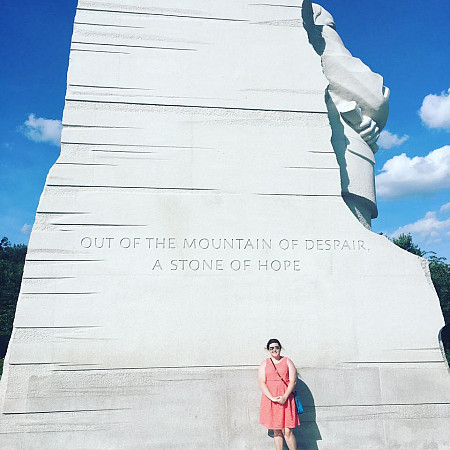
For a first internship to be at the U.S. House of Representatives might seem intimidating, but Kellogg was undaunted. She did have to learn the hard way how to live in DC, a fast-paced and vast metropolitan area that in no way resembles the much quieter Midland and Georgetown, Texas. She scrambled to find housing in Washington’s competitive rental market, unsure whether the room she found at Catholic University would even be furnished, and it was her first time living for a substantial amount of time alone and so far from home. But she had her suitcase, a backpack, a pillow, and her indomitable spirit, so she figured she would just learn by doing.
At the Capitol, she assumed that because she had only one year of college under her belt, she’d be relegated to answering phones. But a serendipitous conversation with a colleague in the office about her interest in fighter jets and other military aviation led her to research assignments on defense science and technology and other foreign-policy issues. Kellogg also wrote legislative briefs and reports, such as on the labeling of genetically modified foods, and led tours around the congressional offices, but it was definitely the military policy that intrigued her. “It’s a joke between me and my friends,” she comments, “that in any conversation, I always end up talking about China, Korea, airplanes, or tanks at some point. Those are my four topics.”
The first internship convinced Kellogg to declare a history major during her sophomore year back at Southwestern. Then, a conversation in spring 2017 with fellow Student Government Association member Donté Houston ’18 spun into a second work opportunity. Houston was working at the Texas Capitol for Richard Peña Raymond, a member of the Texas House of Representatives and chair of the Human Services Committee. Yet again, Kellogg’s imperturbable spirit kicked in. She knew nothing about Human Services, but when she arrived and was told she would have to start researching and writing summaries of bills scheduled to be heard by the committee, she simply fell back on her skills as a history major—as she had in DC—and dug in. “I was using my history experience to process these impossibly long bills,” she recollects. “I had to give them a two-line summary of this 40-page bill. I got more and more practice with that.” The internship also demanded that she apply her close-reading skills: “You have to be careful at the state legislature, too, because little things that don’t really belong in the bill get slipped in, so you have to be very actively reading to catch them sometimes.”
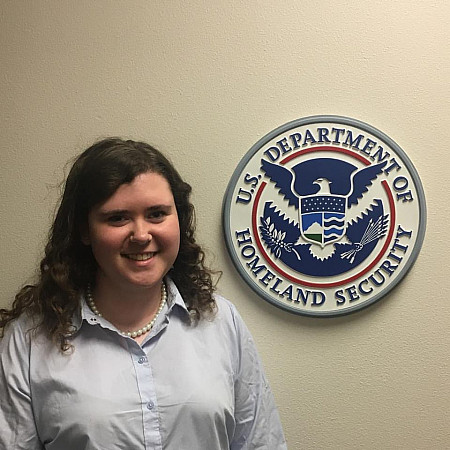
To her surprise, she was accepted and moved to El Paso for two months, a city she had last visited as a site leader for one of Southwestern’s Spring Breakaway programs. She was assigned to Homeland Security Investigations (HSI), an agency that collaborates with the Federal Bureau of Investigations, Coast Guard, Federal Emergency Management Agency, Drug Enforcement Administration, and other organizations to investigate criminal organizations involved in a wide range of illicit activities, including financial and cybercrimes, human-rights violations, drug and human trafficking, and art and antiquity theft. “There are so many incredible people there. It was where I found my passion and where I decided I was really interested in the intelligence community. It was definitely lifechanging,” Kellogg says excitedly. Then, her self-deprecating humor kicks in again. “I’m interested in defense intelligence and foreign military capability—that’s always been fascinating to me. I’m just a nosy person, I guess. I was always a nosy child, and I used to be really annoying in elementary school, but this is manifesting into a potential career, so I guess it’s good,” she quips.
“There are so many incredible people there. It was where I found my passion and where I decided I was really interested in the intelligence community. It was definitely lifechanging.”
Kellogg loved researching individuals, groups, and locations of interest in various HSI cases and found it fun challenging herself to write in DHS Intelligence Report style. She gained an understanding of federal law enforcement, how it interacts with intelligence agencies and state and local law enforcement, and how it relates to national-level security policies. She says that working at the DHS turned out to be an unexpectedly great fit because she ultimately wants to have a positive impact on the community—a calling that she attributes to her History of Human Rights class but also, ironically, to her upbringing in Midland, which she had so wanted to escape when she first applied to college. “In a small town, you help each other out, and my mother always encouraged me to help people, so I think that’s what drew me to public service initially,” she reflects.
But wait, there’s more!
In the summer of 2018, Kellogg returned to Washington, DC, to attend a program with The Fund for American Studies (TFAS), this time funded not through babysitting and GoFundMe but rather by a prestigious Hatton Sumners Foundation Scholarship and Southwestern’s new Funded Internship Program. There, she enrolled in an intimidating course titled International Economic Policy at George Mason University through TFAS’s international affairs track. “The first two weeks, I had no clue what was happening,” she admits; after all, she had not taken any economics courses back at SU. But ever fearless, she studied Khan Academy videos to bring herself up to speed, and during the third week, her professor, Dr. Anne Rathbone Bradley, a specialist on the political economy of terrorism who has published and been interviewed about her research on al-Qaeda, began relating the course content to national security and foreign policy, which helped Kellogg understand the relevance and significance of economics within her own chosen fields.
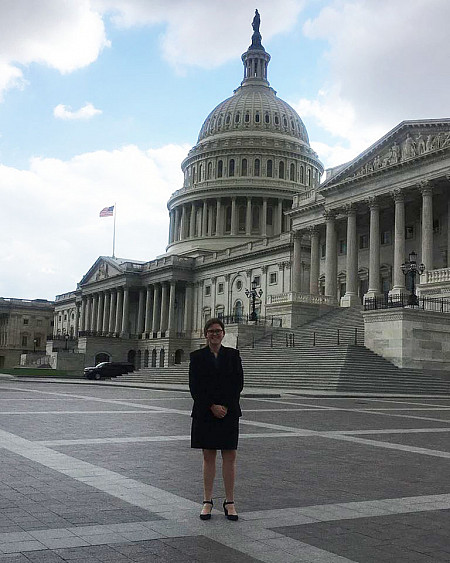
During her senior year, Kellogg served as a paid intern in Southwestern’s Free Speech and Civil Discourse Program as well as a Texas Civic Ambassador for the Annette Strauss Institute for Civic Life and New Politics Forum at the University of Texas at Austin. As part of her leadership position, she attended a conference about Texas voter turnout, coordinated a series of Table Talks on the role of the media in politics, and organized a screening of the film Bring It to the Table, a documentary that aims to bridge partisan divides by encouraging civil dialogue. Kellogg enjoyed the experience because she wanted participants to learn how to engage in productive discussion and understand that disagreeing with someone does not make them your enemy. “The vast majority of people want the best for the country. That’s why I liked working on that project,” she says optimistically.
According to Dana Luna, assistant director of internship and employment development at Southwestern, “Ms. Kellogg embodies our institution’s approach to learning and is an exemplary representative of Southwestern University in multiple ways. She shows great initiative and creativity in pursuing her professional goals. While most students may have one internship, she has completed five—truly exploring the world of work through integrated learning.” Because of Kellogg’s many professional achievements, Luna nominated her for a 2018–2019 Internship Student Achievement Award from the Cooperative Education and Internship Association (CEIA). This past January, Luna announced that Kellogg had won the venerable award, making her the fifth student at Southwestern to earn this distinction and SU the top-awarded university. In 2019, she also earned the Overall Leader of the Year award from Southwestern’s chapter of Omicron Delta Kappa (ODK), a national leadership honor society.
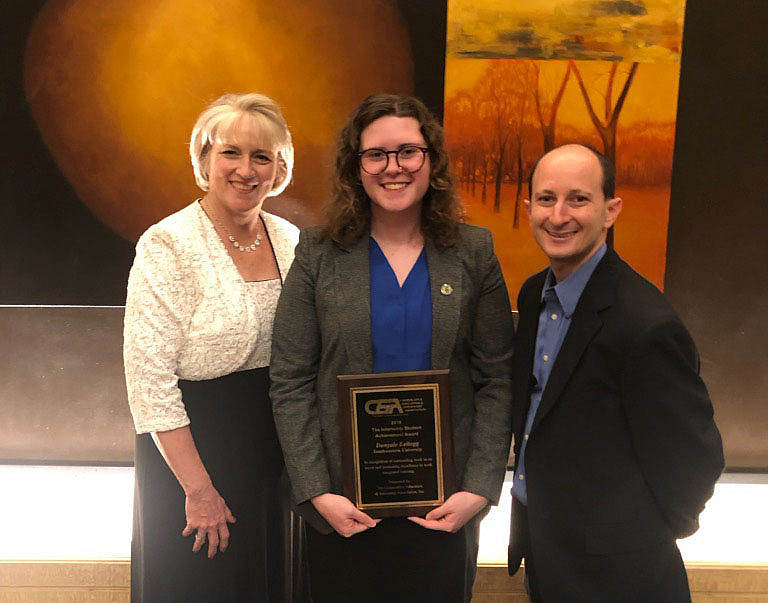
These recognitions should have come as no surprise given her many accolades, but Kellogg remains modest. “Winning the CEIA award is one of the things I’m most proud of,” she comments. “I’m still speechless about it. It was such an honor for me to be nominated. I didn’t think I would win, but I think that representing Southwestern in any capacity is so cool.” She adds that winning the ODK award “was definitely one of my proudest SU moments.”
The languages of a world traveler
One would expect that Kellogg’s minor in German would have gained her fluency in the language, and it has. She’s also had the opportunity to take several independent studies, learning about German war narratives of the 20th century, German foreign policy, and German security policy after the September 11 terrorist attacks and how it has affected relations with the U.S., NATO, and the United Nations.
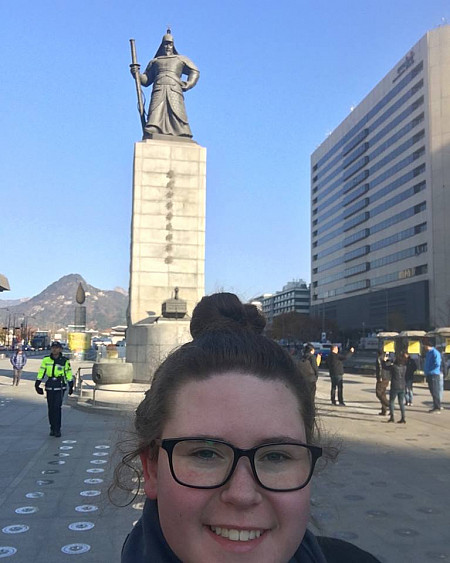
Professor of English David Gaines suggested that she challenge herself by considering a destination where she’d have to be more self-reliant, sans the group dynamics of a Southwestern program such as that in London. She then thought about how she “can’t shut up about Korea and the Korean War” and how she had developed a taste for Korean cuisine and an interest in the culture, which gave her further reason to take up the study of Korean. And so she elected to spend her semester at Ewha Womans University in South Korea, studying Korean, international law and relations, nuclear policy, and security studies.
Korea would end up being one challenge after another, but Kellogg remained steadfast. For example, when she stepped off the plane in Seoul, it really hit the English and German speaker that she couldn’t read a single sign. After settling into her new surroundings, she embarked on a six-credit, 20-hour-per-week course in academic Korean and fully immersed herself in the language. “Korean was very formative for me,” Kellogg recalls. “After the midterm, I was making a 38 in the class. I’m not someone who’s used to struggling academically, and I was putting in a lot of effort.” But after applying her hard-work ethic and picking up some supplementary materials, she ended up passing the course after the final. By semester’s end, she could comprehend Korean newspapers and get by in basic conversations.
During her time in Asia, Kellogg would also encounter other difficulties as well, such as getting her immigration paperwork in order and not having a phone. “This was a time of incredible struggle for me, but it was a good lesson,” she says. It helped that she was enjoying her “really awesome and interesting” other courses—Modern Korean History, U.S.–China Relations, International Security and Peace, and Public International Law—which were mostly in English, although she did sometimes have to ask fellow students to help translate when the professor would lapse back into Korean instead. She was learning how to negotiate being the only American in several of those classes: sometimes, she bore the brunt of anti-American sentiment, and other times, her fellow students would sometimes turn to her to represent—or at least explain—U.S. political positions. She got to write a research paper comparing the American F-35, the Chinese Chengdu J-20, and the Sukhoi Su-35s—bringing her back to her beloved fighter jets. And she was able to stretch her stipend from Southwestern so that she could enjoy her beloved Korean food while visiting the country’s historic palaces and landmarks, an experience which she describes as being “in heaven” and “priceless.”
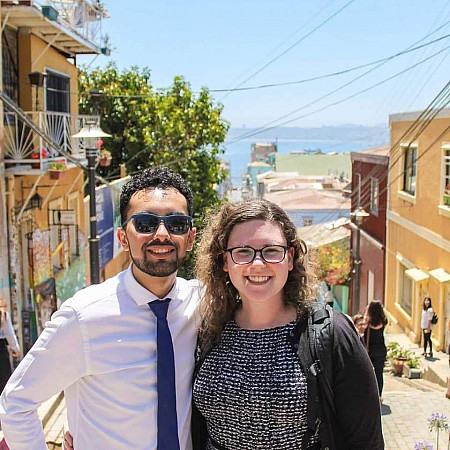
Kellogg enjoyed her whirlwind tour of Santiago, and she was even able to recall her Spanish, which she hadn’t studied since before she arrived at Southwestern. “I took Spanish in high school, but I didn’t want to study it again, so I took German my first semester,” she says. “But when I went to Chile, I got through Peruvian customs, which was all in Spanish, and I transferred all my flights to Santiago just fine, so I guess high-school Spanish stuck with me.”
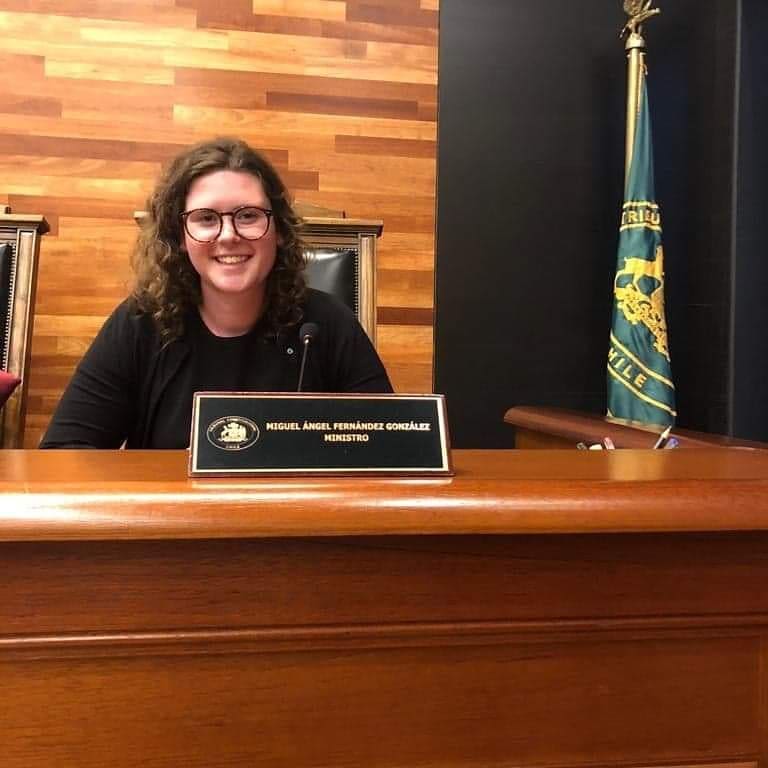
Even beyond Spanish, German, and Korean, she recently took a couple classes in Mandarin at Southwestern. She finds practicing writing Chinese characters “relaxing.” She also loves learning about the history of hangul—the phonetic system used in Korean and also “one of the most brilliant syllabaries,” Kellogg explains—and finds the nuances among Chinese characters, Korean hanja (Chinese characters incorporated into the Korean language), and Japanese kanji “fascinating.” When asked whether she has a facility for languages, Kellogg responds, “Languages definitely make more sense to me than math does. I really appreciate the nuances between different languages.” There’s no doubt that her pursuit of proficiency in multiple tongues will be a boon to her choice of career in intelligence and national defense.
“What are you going to do with a history degree?”
Following graduation, Kellogg enjoyed a few weeks of R&R before moving to College Station to work at the Museum of the American G.I. This fall, she begins graduate coursework at the Bush School of Government and Public Service at Texas A&M University, where she will be pursuing her M.A. in international affairs. She’ll specialize in national security and diplomacy, and she intends to concentrate specifically on China and East Asia, nuclear security, and either intelligence or cybersecurity. She says one of the attractions of the program is that they host an exchange program with partner schools in Germany. She feels well prepared after the rigors of the Southwestern curriculum.
Unsurprisingly, Kellogg admits that she tends to be “always moving forward, goal oriented, and future focused.” Still, she says her final semester at SU was “a good semester to reflect.”
“[SU professors] don’t force their interests on you. They want you to form your own, but they teach them so well that you get interested.”
Looking back at her college career, Kellogg appreciates the History Department faculty, whom she credits as being one of the best parts of her Southwestern Experience because students can’t help but become invested in what their professors are teaching. “They don’t force their interests on you,” she comments. “They want you to form your own, but they teach them so well that you get interested.” For example, she especially enjoyed her capstone project, “Forgotten Intelligence from the Forgotten War: Victory Disease, American Intelligence Failures, and the U.S. Government’s False Perception of the Chinese in the Korean War,” which combined her own interests in East Asia with Assistant Professor of History Jethro Hernandez Berrones’s chosen capstone course topic, science and scientific knowledge in U.S. society. She also just admires how caring her history professors were, providing a source of advice and comfort even when nonacademic stresses—such as when Kellogg once lost her wallet—arose. “The professors here really want the best for you and go out of their way to help you,” she says warmly.
Beyond her academic mentors, Kellogg will also miss Ms. Ella, who was “there when I’ve had rough times,” and she values the connections she made with various alumni. Besides the people, she also appreciates Southwestern’s wildlife: “The squirrels here are very daring,” she laughs.
In the end, the first-generation college student and now graduate is grateful that she ended up choosing to attend college—and to attend SU specifically—after all. “Southwestern has changed me. I am on a path toward a career in national security, I have embraced my love of foreign languages, and I can confidently answer the ‘What are you going to do with a history degree?’ question. I have seen more and done more in four years than I could have ever imagined doing in a lifetime as a high school senior, and I owe it all to the opportunities afforded to me by my family and by Southwestern University. I don’t think I could have done this well anywhere else, and I think a lot of students say the same thing. This school is unique for a number of reasons, the most important of which are its people and its opportunities. This school is difficult and challenges you in many ways, but it is so worth the investment.”
















